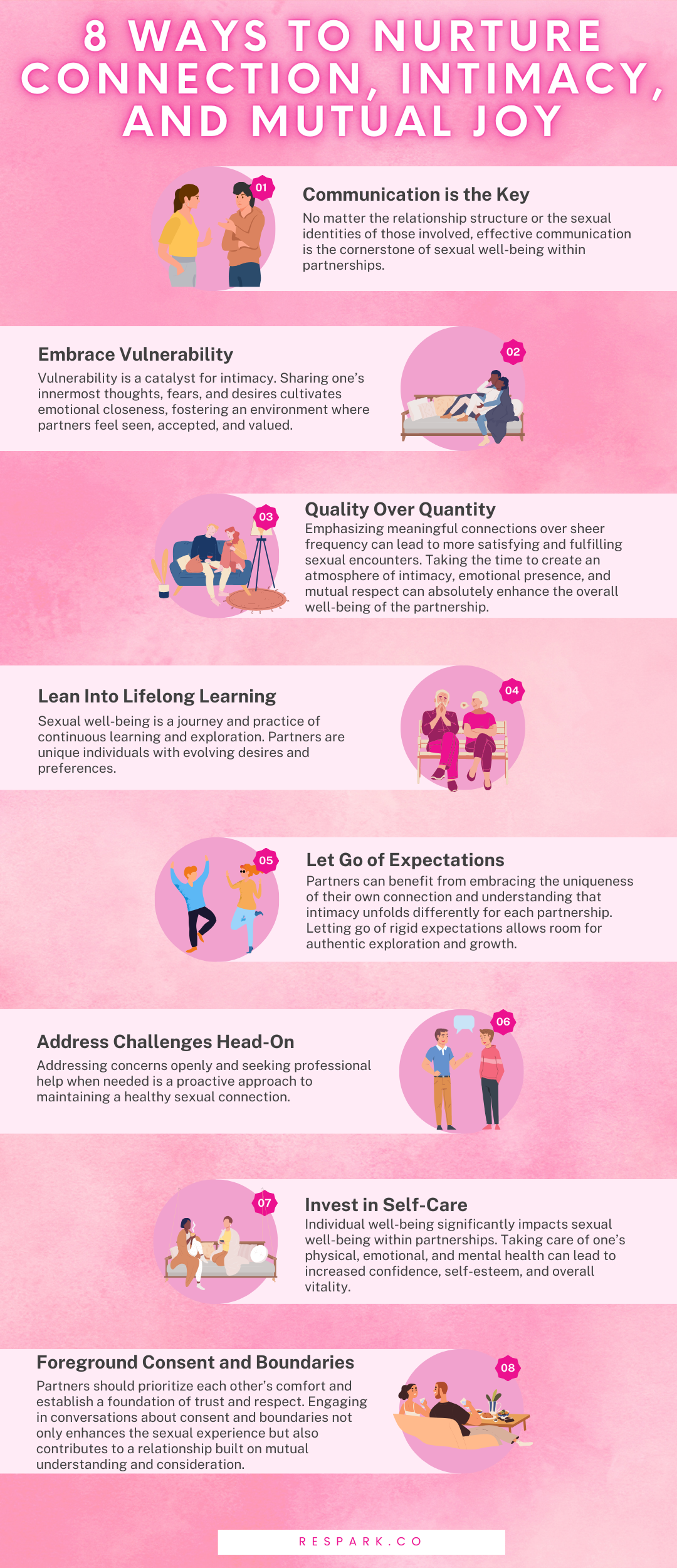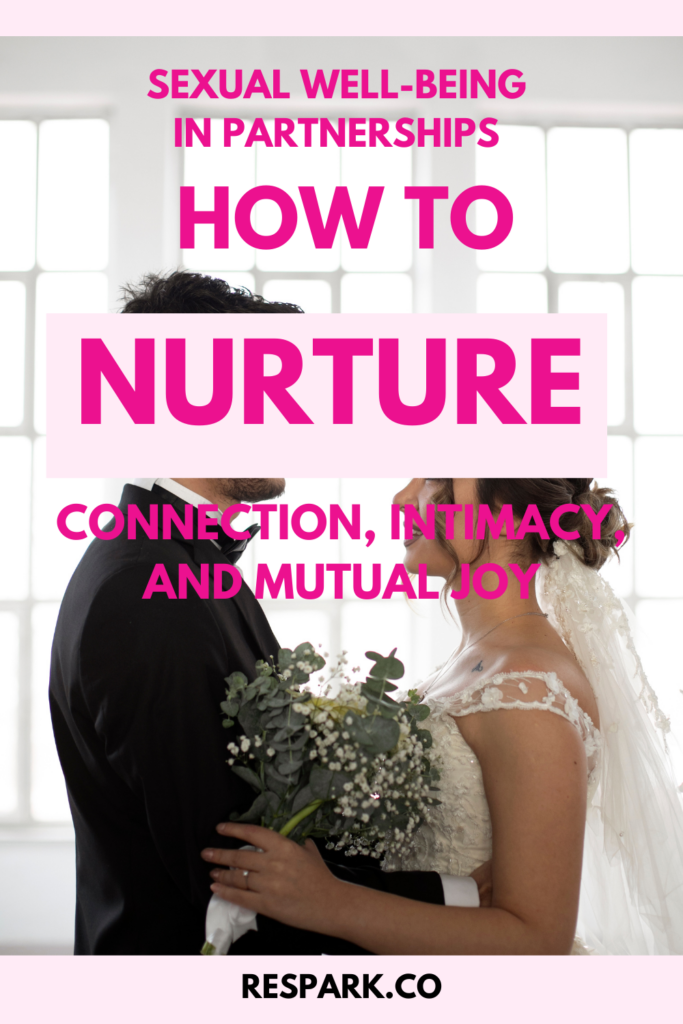Sexual Well-Being in Partnerships: How to Nurture Connection, Intimacy, and Mutual Joy
Sexual well-being is an integral component of a healthy and fulfilling partnership, going beyond mere physical satisfaction to also include emotional, psychological, and relational aspects. As couples (and polycules) navigate the intricate—and sometimes, delicate—landscape of sexual intimacy, a deeper understanding of the factors influencing sexual well-being in partnerships becomes crucial.
We spoke with Ley David Elliette Cray, PhD, CSC, ABS (she/they)—certified sexologist, Sexual Health Alliance certified sexuality counselor, and SHA’s Gender, Sexuality, and Relationship Diversity Content Specialist—to explore key insights that can empower partners in nurturing a vibrant and satisfying sexual connection while fostering overall relationship health.

Insight #1 | Communication is the Key
“Good communication won’t guarantee good sex,” Ley tells us, “but poor communication pretty much ensures that any on-going sexual connection will disappoint all involved. The best thing you can do for your sexual well-being is to explore how you and your partner(s) best communicate, and then, well, do it.”
No matter the relationship structure or the sexual identities of those involved, effective communication is the cornerstone of sexual well-being within partnerships. Open, honest, and non-judgmental conversations about desires, boundaries, and preferences lay the foundation for a satisfying and comfortable sexual dynamic. Partners who can openly express their needs and listen to each other without judgment create a space where intimacy can flourish. Regular check-ins and discussions about sexual satisfaction, concerns, and fantasies contribute to a deeper connection and understanding.
Insight #2 | Embrace Vulnerability
Vulnerability is a catalyst for intimacy. Sharing one’s innermost thoughts, fears, and desires cultivates emotional closeness, fostering an environment where partners feel seen, accepted, and valued. Embracing vulnerability requires trust and mutual respect, allowing individuals to let down their guard and truly connect on a potentially profound level. By acknowledging and supporting each other’s vulnerabilities, partners can create a safe haven for exploration and connection, of the sexual variety and beyond.
“Talking openly about sexuality—about our desires, our fantasies, our apprehensions, and more—can feel vulnerable and scary,” Ley says, “making communication about that vulnerability and fear essential.”
Insight #3 | Quality Over Quantity
Ley suggests that partners ask among themselves: “would we rather be having frequent but less fulfilling sex, or instead investing in more intentional, more meaningful encounters that occur perhaps slightly less often?”
Contrary to societal pressure, sexual well-being isn’t solely about frequency. Instead, the focus should be on the quality of the intimate experiences shared between partners. Emphasizing meaningful connections over sheer frequency can lead to more satisfying and fulfilling sexual encounters. Taking the time to create an atmosphere of intimacy, emotional presence, and mutual respect can absolutely enhance the overall well-being of the partnership.
Insight #4 | Lean Into Lifelong Learning
Sexual well-being is a journey and practice of continuous learning and exploration. Partners are unique individuals with evolving desires and preferences. As such, engaging in open dialogue and remaining curious about each other’s changing needs is paramount. Couples and polycules can explore new experiences together, educate themselves about sexual health and previously unfamiliar sexual practices, and seek guidance from professionals to enhance their sexual connection.
“Sexuality is a big place—for any individual person, there will be a lot of uncharted territory. As we explore our preferences and as our self-understanding and identities evolve, different means of connection and expression might spark our interest. Just imagine you and your partner(s) leaning into your confident-yet-humble sexual selves, aware of how much is still out there to learn and explore—how hot is that?”
Insight #5 | Let Go of Expectations
“Entering into a sexual partnership with rigid expectations is a recipe for disappointment,” Ley cautions. “We end up engaging not with the person(s) actually in front of us, but with imaginary versions that we want them to be—or that we are told that we should want them to be.”
Unrealistic expectations can hinder sexual well-being by creating unnecessary pressure and disappointment. Media and societal narratives often project an idealized version of intimacy that may not align with reality. Partners can benefit from embracing the uniqueness of their own connection and understanding that intimacy unfolds differently for each partnership. Letting go of rigid expectations allows room for authentic exploration and growth.
Insight #6 | Address Challenges Head-On
Every partnership faces challenges, and sexual well-being is not exempt from them. Addressing concerns openly and seeking professional help when needed is a proactive approach to maintaining a healthy sexual connection. Whether it’s navigating performance anxiety, medical issues, or discrepancies in desire, confronting challenges together fosters resilience and reinforces emotional bonds.
“No ongoing sexual partnership will be without its challenges,” Ley tells us. “Collaborating to address these challenges gives us even more opportunity for find and offer support, safety, and connection.”
Insight #7 | Invest in Self-Care
When it comes to the topic of self-care, Ley offers a helpful reminder: “We can’t show up for our partners if we aren’t showing up for ourselves. When we leave ourselves behind, our sexual lives will suffer, too.”
Individual well-being significantly impacts sexual well-being within partnerships. Taking care of one’s physical, emotional, and mental health can lead to increased confidence, self-esteem, and overall vitality. Self-care extends to nurturing personal interests, hobbies, and passions, which in turn can enrich a partnership by bringing a well-rounded and vibrant energy to the relationship.
Insight #8 | Foreground Consent and Boundaries
Respecting each other’s boundaries and practicing enthusiastic consent are vital components of sexual well-being. Partners should prioritize each other’s comfort and establish a foundation of trust and respect. Engaging in conversations about consent and boundaries not only enhances the sexual experience but also contributes to a relationship built on mutual understanding and consideration.
“Foregrounding discussions of consent and mutual reflections on boundaries creates a container where we can engage in sexual exploration freely, playfully, and deeply,” Ley says. “For a little extra fun, you can even frame these discussions as part of your foreplay—though make sure you get consent for that first, too.”
Create a nurturing environment where sexual intimacy flourishes
Sexual well-being in partnerships is a multi-faceted journey that intertwines emotional connection, communication, vulnerability, and personal growth. By prioritizing open dialogue, embracing vulnerability, and letting go of unrealistic expectations, couples can create a nurturing environment where sexual intimacy flourishes. Addressing challenges, investing in self-care, and foregrounding discussions of consent and boundaries all contribute to a holistic approach to sexual well-being that enriches the partnership and fosters lasting connections. “If this sounds like a lot of effort and investment,” Ley emphasizes, “just remember: the payoff is more than worth it.”
Respark Therapy excels in cultivating a nurturing environment where sexual intimacy thrives within partnerships. With its specialized expertise in both relationship dynamics and sexual health, Respark provides a safe and non-judgmental space for couples to explore their intimate concerns. Respark therapists are adept at fostering open dialogue and guiding couples through effective communication techniques, enabling them to discuss desires, boundaries, and challenges openly.
By addressing underlying emotional and psychological factors that may impact sexual intimacy, Respark empowers couples to embrace vulnerability, fostering a deeper emotional connection. Through tailored strategies, evidence-based techniques, and a commitment to understanding each partnership’s unique dynamics, Respark Therapy paves the way for couples to create an atmosphere where sexual well-being is prioritized, leading to a more fulfilling and satisfying intimate connection.
A special thanks to Ley David Elliette Cray, PhD, CSC, ABS (she/they)—certified sexologist and Sexual Health Alliance certified sexuality counselor for their expertise and contribution to this article. You can learn more about Ley at their website, Transentience Coaching, LLC.

